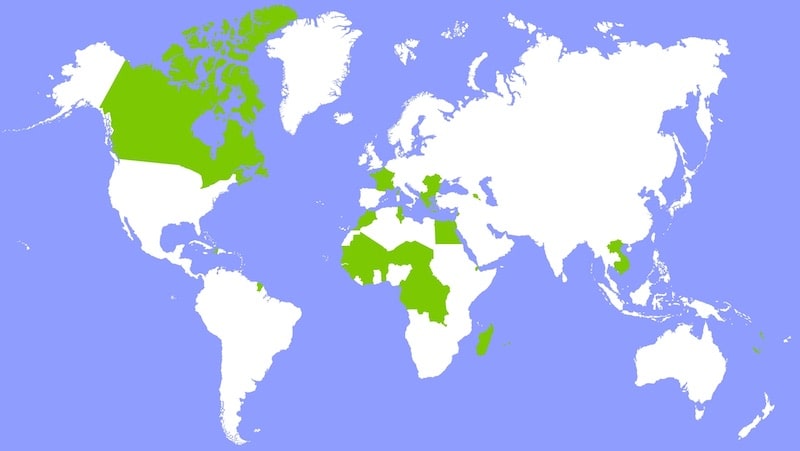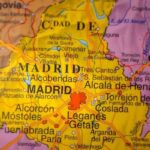We explain which countries speak French and what loans of that language there are in Spanish. In addition, we tell you the history of the French language.

What countries speak French?
The French It is a Romance language of European origin, from northern France and of which there are around 300 million speakers in the world, including native speakers, speakers for work and speakers as a second language. It is the official language of around 25 countries in the world and is the fourth most spoken language on the European continent.
Like other languages of European origin, French experienced great expansion and influence during the era of colonialism after being implemented in different regions of Africa, America and Asia. This linguistic expansion also allowed the emergence of numerous variants and dialects, often fused with other local languages, such as created himhe cajun and Franco-Guyanese.
On the other hand, there are historical variants typical of the European region, such as Northern French, Southern French, Belgian French, Swiss French and Aosta Valley French (influenced by Franco-Provençal).
See also: Countries that speak Spanish
History of the French language
What we call France today was in ancient times the home of various Celtic cultures. that they spoke different languages and lacked writing, and that between 58 and 51 BC. C. were conquered by the Romans, who imposed Latin as their language.
The Romans baptized this new province of their empire as Gaul, but lost it during their political and military decline, at the hands of new Germanic peoples who settled there: the Franks to the north and the Visigoths to the south.
From this ethnic and linguistic mix two local variants of Latin emerged: the northern or Provençal variant (which would later become French), and the southern or Occitan variant. The first was known as language d'oïl (“language of oil) and to the south as langue d'oc (“language of oc“), since those were their respective ways of saying “yes.”
Provençal was consolidated as a local language between the 6th and 9th centuries, and eventually became the so-called Old French around the 11th century, despite the fact that it was not really a single language spoken in all the territories north of the Loire River, but rather a very similar set of dialects. Subsequently, Towards the 14th century, the so-called Middle French emerged, transitional stage towards the modern language that culminated around the 18th century.
At the time of the French Revolution, In 1789, it is estimated that barely a quarter of France's population spoke French ; the rest used other regional languages (Patois), many coming from Occitan. So The unification of the language into a single French language that would serve to communicate to all the people was proposed work carried out by different French intellectuals (hence why it is said to be an “academic” language), such as Charles Maurice de Talleyrand and Jules Ferry.
So, Once the 19th century entered, modern French was the norm in the French public sphere and in the 20th century the so-called Patois They were progressively discredited and abandoned, in favor of the new unified cultural norm.
Characteristics of French
The French language is characterized by the following:
- It is the eighth most spoken language in the world with around 235 million daily speakers, of which around 150 million are native speakers.
- It is a Romance language, that is, derived from spoken Latin (Vulgar Latin), belonging to the group of Gallo-Romances or Gallo-Romanesque, typical of northern France, northern Italy and Switzerland. These include French, Catalan and Lombard, among others.
- Its alphabet coincides with the 26 letters of the modern Latin alphabet, to which are added the cedilla (ç), two vowel ligatures (æ and œ) and 13 accented vowels with three types of accent: grave (à, è, ù), acute (é) and circumflex (â, ê, î, ô, û), in addition to the umlaut (ë, ï, ü, ÿ). French spelling is one of the most complicated among the Romance languages.
- It has a partially vigesimal numeral system since the twenty (vingt) is used as the basis for the numbers 60 to 99.
- He inherited a much more nasal tone from his Germanic roots than the rest of the Romance languages.
Countries where French is spoken

French is spoken in numerous countries, although in different percentages of the population. In some of them it occupies the status of an official language, while in others it is a minority language.
| Country | % of French-speaking citizens | Total French-speaking population | Status of the French language |
|---|---|---|---|
| France | 95.48% | 62,492,900 inhabitants | official language |
| Algeria | 69.98% | 24,796,000 inhabitants | minority language |
| Andorra | 5.38% | 4,100 inhabitants | minority language |
| Belgium | 39.71% | 4,300,000 inhabitants | co-official language |
| Benin | 8.02% | 739,000 inhabitants | official language |
| Burkina Faso | 4.26% | 695,000 inhabitants | co-official language |
| Burundi | 4.57% | 390,000 inhabitants | co-official language |
| Cameroon | 14.78% | 2,950,300 inhabitants | co-official language |
| Canada | 22.63% | 7,741,955 inhabitants | co-official language |
| Chad | 17.20% | 1,940,000 inhabitants | co-official language |
| Comoros | 42.49% | 312,200 inhabitants | co-official language |
| Ivory Coast | 59.06% | 12,740,000 inhabitants. | official language |
| Democratic Republic of the Congo |
41.60% |
32,222,000 inhabitants. |
co-official language |
| Djibouti | 17.98% | 159,800 inhabitants | co-official language |
| Equatorial Guinea | 14.27% | 100,000 inhabitants | co-official language |
| Gabon | 74.61% | 1,120,000 inhabitants | official language |
| Guinea | 19.37% | 2,000,000 inhabitants | official language |
| Haiti | 55.59% | 5,664,000 inhabitants | co-official language |
| Lebanon | 44.98% | 1,902,000 | minority language |
| Luxembourg | 84.82% | 430,000 inhabitants | co-official language |
| Madagascar | 4.09% | 865,000 inhabitants | co-official language |
| Mali | 7.62% | 1,107,000 inhabitants | official language |
| Morocco | 32.50% | 10,366,000 | minority language |
| Mauritania | 4.83% | 167,399 inhabitants | minority language |
| Monaco | 66.08% | 23,400 inhabitants | official language |
| Niger | 7.92% | 1,260,000 inhabitants | official language |
| Rwanda | 5.92% | 609,000 inhabitants | co-official language |
| Senegal | 9.09% | 1,170,000 inhabitants | official language |
| Seychelles | 4.62% | 4000 inhabitants | co-official language |
| Swiss | 19.39% | 1,509,600 inhabitants | co-official language |
| Central African Republic | 21.42% | 945,000 inhabitants | co-official language |
| Republic of the Congo | 29.67% | 1,200,000 inhabitants | co-official language |
| Togo | 29.49% | 2,000,000 inhabitants | official language |
| Tunisia | 60.96% | 6,360,000 inhabitants | minority language |
| Vanuatu | 41.31% | 99,000 inhabitants | co-official language |
Linguistic loanwords from French in the Spanish language
There are loans taken from French in the Spanish language, called gallicisms Most of them have to do with additions to the Hispanic lexicon, such as the words “menú”, “poster”, “amateur”, “ballet”, “bayonet”, “bloc”, “bureaucracy”, “cabotage”. , “entrecot”, “chauffeur”, “gallop”, “fop” or “lutier”; or with expressions like enfant terrible, forward the letter either gourmetwhich are used in their original form.
However, There are also certain syntactic uses from French as is the case of constructions: noun + a + verb in infinitive, as in “problem to solve” or “prize to win”.
Another use taken from French is called how gallicI mean, the “that” used as a relative adverb instead of an adverb of time or manner, after a conjugated verb “ser.” For example: “last Sunday was that we arrived” (instead of “when we arrived”) or “How beautiful your wife is” (instead of “how beautiful she is”).
Continue with: Countries that speak Portuguese
References
- “Countries where French is the official language” on Wikipedia.
- “Francophonie and French language” at the French Ministry of Foreign Affairs.
- “The small subtleties of the French language” on Campus France.
- “French language (français)” in The Encyclopaedia Britannica.





